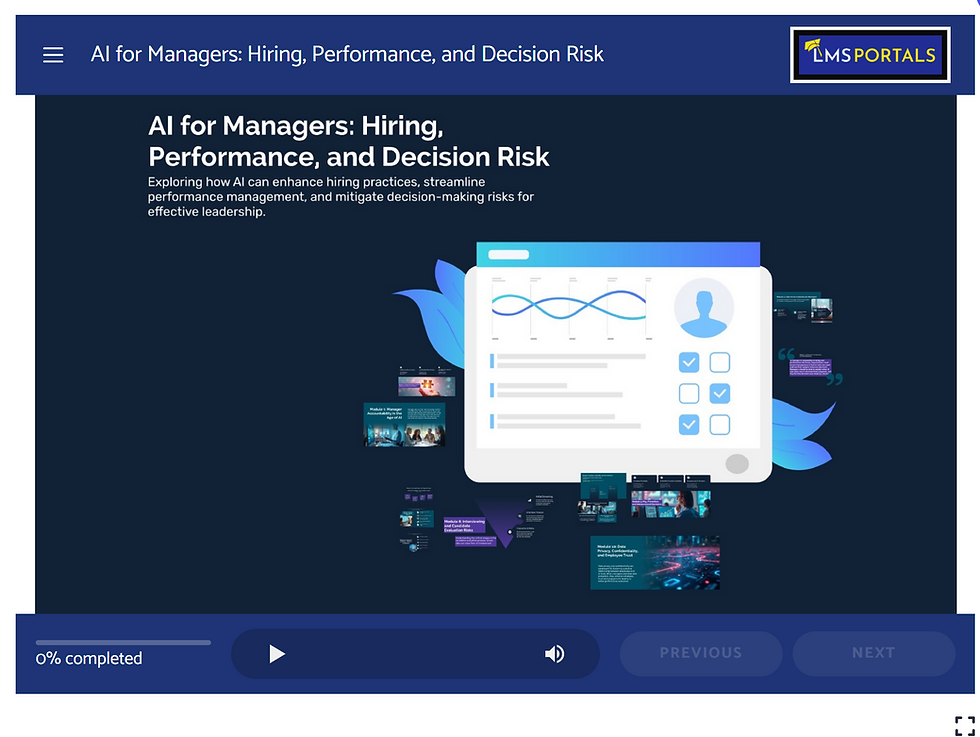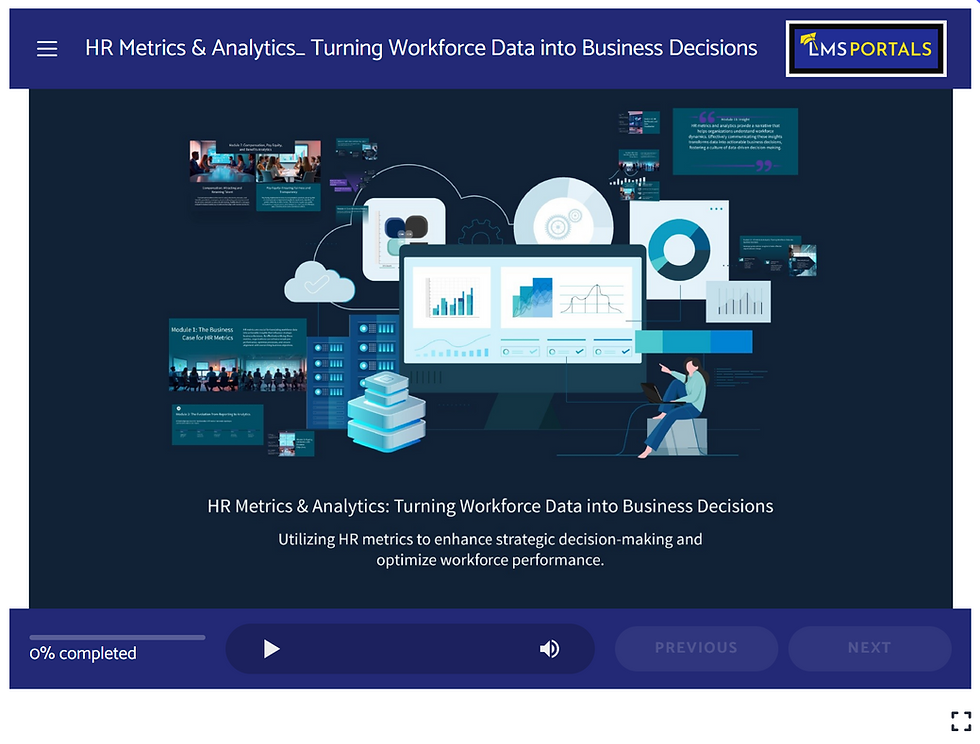The Role of an LMS in Your Talent Management Strategy
- LMSPortals

- Apr 4, 2023
- 4 min read

A talent management strategy is a systematic and integrated approach to attracting, developing, and retaining talented employees in an organization. It involves a set of practices and processes aimed at identifying and nurturing talent within an organization and aligning the talent with the organization's strategic goals and objectives.
A comprehensive talent management strategy includes the following key components:
Talent Acquisition
This involves identifying and attracting talented individuals to join the organization. It includes creating job descriptions, posting job ads, screening resumes, interviewing candidates, and making job offers.
Performance Management
This involves setting clear expectations for employees and regularly reviewing their performance. It includes goal setting, performance feedback, and performance evaluations.
Learning and Development
This involves providing employees with the necessary training and development opportunities to enhance their skills, knowledge, and abilities. It includes on-the-job training, coaching, mentoring, and formal training programs.
Succession Planning
This involves identifying and developing employees who have the potential to fill critical roles within the organization in the future. It includes creating a pipeline of talent for key positions and developing strategies to fill leadership gaps.
Career Development
This involves providing employees with opportunities for career growth and development within the organization. It includes creating career paths, offering job rotations, and providing development opportunities.
The right talent management strategy helps organizations to attract and retain talented employees, improve employee performance and productivity, and achieve their strategic goals and objectives. It also helps to create a positive work culture and increase employee engagement and satisfaction.
The Role of a Learning Management System (LMS) in Your Talent Management Strategy
A Learning Management System (LMS) plays a crucial role in an organization's talent management strategy. It is a software application that allows businesses to deliver, manage, and track training and development programs for their employees.
Here are some ways an LMS can contribute to talent management:
Centralized Learning
An LMS provides a central platform to deliver all learning and development programs to employees. It enables HR and L&D teams to create, upload, and manage course content, including videos, documents, presentations, and quizzes, in one location.
Customized Learning
An LMS allows organizations to offer personalized learning paths to employees based on their job role, skill level, and learning goals. Employees can access training content anytime, anywhere, and at their own pace, ensuring they receive the right training to perform their jobs effectively.
Performance Evaluation
An LMS enables HR teams to track employee performance and progress through automated assessments, quizzes, and exams. This allows organizations to identify areas where employees need additional training and development, and provides insight into employee performance that can inform decisions around promotions, job assignments, and career development.
Compliance Training
An LMS ensures that all employees receive the necessary compliance training required for their job roles. The LMS can track employee training completion and provide reports on compliance training, which can be used for audit purposes.
Learning Analytics
An LMS generates data on employee performance, progress, and training completion, which can be used to improve learning and development programs. HR and L&D teams can use analytics to identify trends, measure the impact of training programs, and optimize training content to meet the needs of employees.
How to Choose the Right LMS to Support Your Talent Management Strategy
Choosing the right Learning Management System (LMS) for your talent management program is essential to ensure the success of your organization's training and development efforts.
Here are some factors to consider when selecting an LMS for your talent management program:
User-Friendly Interface: The LMS should have a user-friendly interface that is easy for employees to navigate and use. It should also have a responsive design that works well on mobile devices, allowing employees to access training content on-the-go.
Customization Options: The LMS should provide customization options to enable organizations to tailor the platform to their unique training and development needs. This includes the ability to create custom courses, assessments, and certification programs.
Integration with Other Systems: The LMS should integrate with other systems, such as HRIS, CRM, and performance management tools, to provide a seamless user experience and streamline the training and development process.
Reporting and Analytics: The LMS should provide robust reporting and analytics capabilities to track employee progress and performance. This includes the ability to generate real-time reports and dashboards to monitor training completion rates, learner engagement, and course effectiveness.
Security and Compliance: The LMS should have robust security features to protect sensitive employee data and comply with industry standards and regulations, such as GDPR, HIPAA, and FERPA.
Vendor Support and Service: The LMS vendor should provide reliable and responsive customer support and service, including training, technical support, and system updates.
Cost and Value: The LMS should be cost-effective and provide value for the organization's investment. This includes a transparent pricing model, no hidden fees, and scalable pricing options based on the number of users.
By considering these factors, your organization can select an LMS that meets your talent management needs and supports your training and development goals.
About LMS Portals
At LMS Portals, we provide our clients and partners with a SaaS-based, multi-tenant learning management system that allows you to launch a dedicated training environment (a portal) for each of your unique audiences.
The system includes an embedded SCORM-compliant course authoring tool that enables most anyone to build engaging courses quickly and easily.
We also offer a complete library of ready-made courses, covering most every aspect of corporate training and employee development.
If you choose to, you can create Learning Paths to deliver courses in a logical progression and add structure to your training program. The system also supports Virtual Instructor-Led Training (VILT) and provides tools for social learning.
Together, these features make the LMS Portals platform and content an ideal solution for your organization and your talent management strategy.
Contact us today to get started or visit our Partner Program pages



Comments